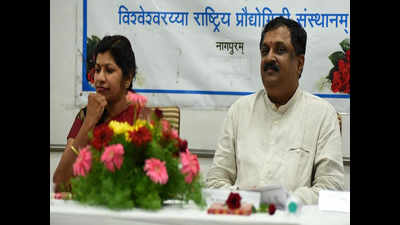- News
- City News
- nagpur News
- Sanskrit has a key role to play in computers, says KKSU vice-chancellor
Trending
This story is from September 13, 2018
Sanskrit has a key role to play in computers, says KKSU vice-chancellor

Kalyani Kale and Shrinivasa Varakhedi at the programme
NAGPUR: Sanskrit is not only the language of temple but also of laboratory, said Shrinivasa Varakhedi, vice-chancellor of Kavikulguru Kalidas Sanskrit University (KKSU), Ramtek, on Wednesday.
Emphasizing the importance of Sanskrit in the field of science and technology, Varakhedi said, “We don’t claim that all technical solutions can be obtained from the shlokas but they can definitely incline you towards science and lay a rock solid foundation for you.”
Varakhedi was speaking at the inauguration of ‘Pratham Diksha Course’ at the electrical engineering department of Visvesvaraya National Institute of Technology (VNIT).
This is the second year of the non-formal course in basics of Sanskrit language at VNIT which is recognized by Rashtriya Sanskrit Sansthan under the aegis of the ministry of human resource development. Around 30 students and faculty members took up this certificate course last year and the ones who passed will now join the ‘Dwitiya Diksha Course’ which will give a diploma.
The perception of Sanskrit has changed drastically in the past two decades, said Varakhedi. “After interaction with scientists and technocrats, I have come to the conclusion that Sanskrit is mathematics,” he said and pointed out ancient scholar Panini as the father of computer programming.
Chandragupta Warnekar, an expert on this subject, said that Sanskrit follows ‘free word order’ which means that despite the words being written in random sequence, the sentence still sounds meaningful. This unique feature makes Sanskrit very favourable for programming in computers.
According to Khedkar, the certification is equivalent to the degrees like bachelors of arts and others. The classes will be conducted twice in a week in the electrical department with an affordable fees of Rs350.
“We have a treasure dwelling in our culture which is so resourceful. We aim to bridge the gap between language and modern sciences and make the study material in shlokas useful to the masses,” he added.
Emphasizing the importance of Sanskrit in the field of science and technology, Varakhedi said, “We don’t claim that all technical solutions can be obtained from the shlokas but they can definitely incline you towards science and lay a rock solid foundation for you.”
Varakhedi was speaking at the inauguration of ‘Pratham Diksha Course’ at the electrical engineering department of Visvesvaraya National Institute of Technology (VNIT).
This is the second year of the non-formal course in basics of Sanskrit language at VNIT which is recognized by Rashtriya Sanskrit Sansthan under the aegis of the ministry of human resource development. Around 30 students and faculty members took up this certificate course last year and the ones who passed will now join the ‘Dwitiya Diksha Course’ which will give a diploma.
During the great demand of admissions, the course is open to all from this year onwards. Dr Kalyani Kale has been appointed as course instructor for VNIT while professor Mohan Khedkar will be the coordinator.
The perception of Sanskrit has changed drastically in the past two decades, said Varakhedi. “After interaction with scientists and technocrats, I have come to the conclusion that Sanskrit is mathematics,” he said and pointed out ancient scholar Panini as the father of computer programming.
Chandragupta Warnekar, an expert on this subject, said that Sanskrit follows ‘free word order’ which means that despite the words being written in random sequence, the sentence still sounds meaningful. This unique feature makes Sanskrit very favourable for programming in computers.
According to Khedkar, the certification is equivalent to the degrees like bachelors of arts and others. The classes will be conducted twice in a week in the electrical department with an affordable fees of Rs350.
“We have a treasure dwelling in our culture which is so resourceful. We aim to bridge the gap between language and modern sciences and make the study material in shlokas useful to the masses,” he added.
End of Article
FOLLOW US ON SOCIAL MEDIA










